CONTACT INFORMATION
Quezon City Protection Center
- QCPC
- QC General Hospital and Medical Center Compound, Seminary Road, Barangay Bahay Toro, Quezon City
- 8863-0800 local 714, 7006-1513, Bahay Kanlungan: 7005-6103
- protectioncenter@quezoncity.gov.ph
- Official Facebook Page of Quezon City Protection Center
Office Hours:
Monday to Friday
8:00 a.m. to 5:00 p.m.
ABOUT US
Description
The QCPC for Victim-Survivors of Gender-Based Violence and Abuse is a one-stop-shop crisis center that provides a multidisciplinary approach to the needs of women, children, lesbians, gays, bisexuals, and transsexuals (LGBT) who are victims of violence and abuse. It facilitates a more holistic and effective response to case management and provides comprehensive programs and services for the healing, recovery, rehabilitation, and reintegration of victim-survivors and their families. It provides a multitude of critical care and services social work intervention, medical, legal, safety, psychosocial, and economic under one roof.
Mission
To be committed to providing a one-stop-shop crisis center with a multidisciplinary approach to quality care and treatment for victim-survivors of abuse, violence, and exploitation and their families. It is also committed to empowering the community to respect and protect the rights of women, children, lesbians, gays, bisexuals, and transsexuals through information campaigns and education.
Vision
Envisions a city that respects the rights of women, children, lesbians, gays, bisexuals, and transsexuals, and protects them from all forms of abuse, violence, and exploitation.
Legal Bases
The QCPC for Victims of Gender-Based Violence and Abuse responds to the following laws and provisions:
- UN Convention on the Elimination of Discrimination Against Women
- UN Convention on the Rights of the Child
- The 1987 Constitution of the Republic of the Philippines, Section 3
- Republic Act 9710 or the Magna Carta of Women, Section 9
- The Child and Youth Welfare Code (PD603) Article 3, Section 10
- Republic Act 7610 or the Special Protection of Children against Child Abuse, Exploitation and Discrimination Act, Section 2
- Republic Act 9262 or the Anti-Violence against Women and Children Act, Section 40
- RA 8505 or the Rape Victim Assistance and Protection Act, Section 3
- Ordinance SP-1401, S-2004 – Quezon City Gender and Development Code, Section 12 mandates the comprehensive support to women-survivors of violence.
- Ordinance SP-566, S-1997 – The Ordinance designates a portion of the Quezon City General Hospital as a “Crisis Center for Battered Women.”
- Ordinance SP-2191, S-2012 – Creating a Quezon City Protection Center for Women, Children, Lesbians, Gays, Bisexuals, and Transgenders who are victims/survivors of violence and abuse, adopting a comprehensive program thereof, and for other purposes.
Service Pledge
We will comply with the legal mandates and requisites of the Magna Carta of Women, Quezon City Gender and Development Code, and other related laws.
We will ensure sensitive and responsive services is provided by the personnel in the Protection Center for victim-survivors of gender-based violence.
We will protect our clients by upholding the confidentiality of cases handled in the center and guarantee their safety thru the center’s aftercare and shelter program.
SERVICES
MEDICAL SERVICE
- All victim-survivors should receive complete medical service in the form of medico-legal examination including the conduct of acute medical treatment, minor surgical treatment, monitoring, and follow-up.
- Upon informed consent, victims of gender-based violence should undergo medical tests to rule out any reproductive tract infection (RTI), sexually transmitted infection (STI), and HIV/AIDs within a week after admission. If a victim-survivor is infected, a referral for further treatment to an appropriate medical facility should be made.



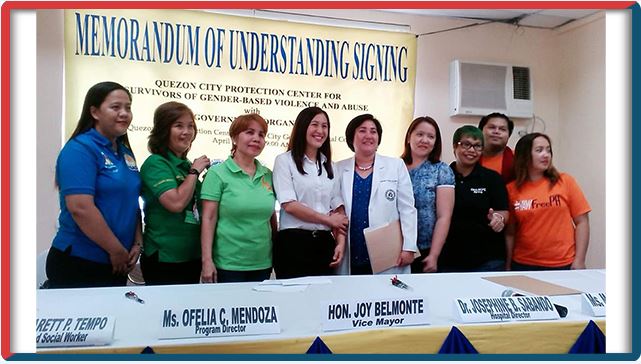
PSYCHOLOGICAL/ PSYCHOSOCIAL SERVICES
This refers to administering a series of psychological tests to determine the IQ, aptitude, interests, and emotional state of the victim as a basis for determining the most appropriate intervention that will facilitate healing and recovery of the victim-survivor.
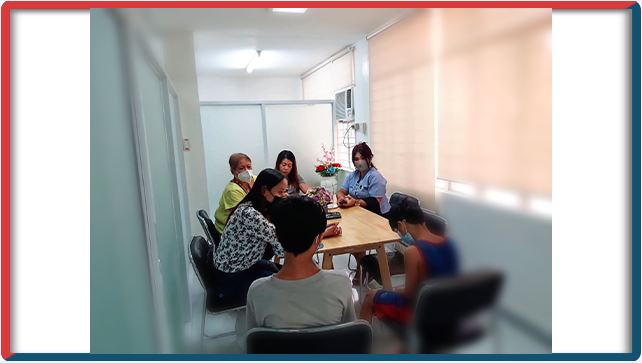
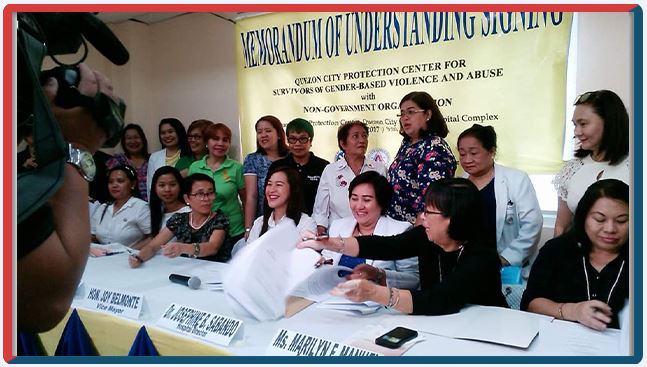
COUNSELING SERVICES
This intervention focuses on assisting the victim-survivor in processing the painful experience and feelings of anger, grief, anxiety, embarrassment, and others. The intervention also helps the victim-survivor cope with the trauma and stress with the end goal of healing and recovery. This intervention includes individual counseling, group therapy, family counseling, play therapy, and other related activities.
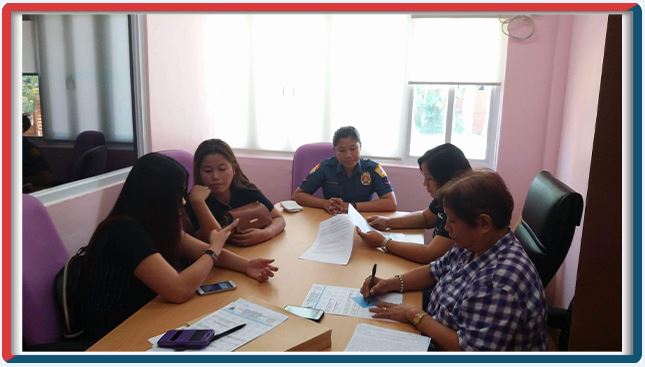
LEGAL COUNSELING
This refers to the provision of legal counseling to victim-survivors and their families. The legal adviser of the Protection Center explains to the victim-survivors all possible legal measures in pursuing a case in court against the perpetrator. This service also provides referral services to the Prosecutor’s Office and Public Attorney’s Office in Quezon City, and other institutions providing legal services.
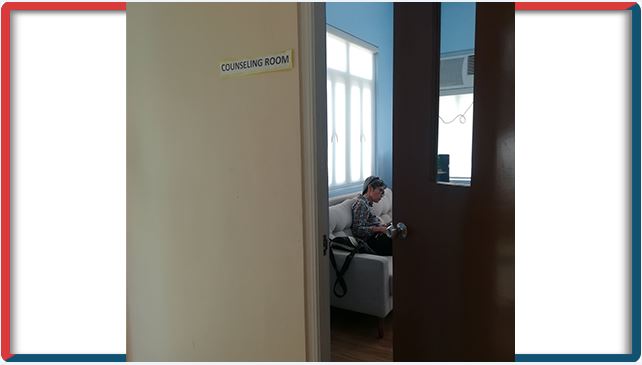
QC TEMPORARY SHELTER (QC BAHAY KANLUNGAN)
Quezon City formally opened on November 27, 2020, the “Bahay Kanlungan”, a temporary shelter for abused women, children, and members of the LGBTQ (lesbian, gay, bisexual, transgender, and queer).
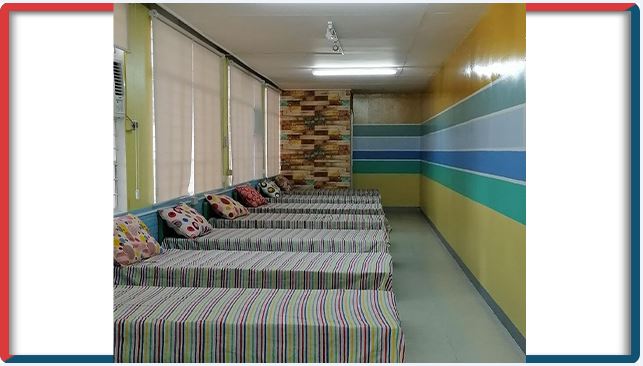
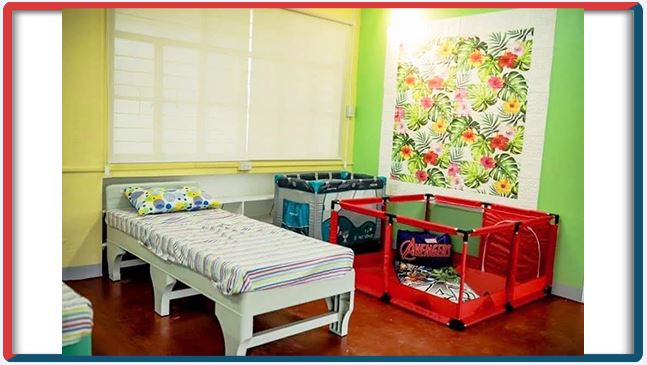
AFTER-CARE SERVICES
This refers to services to support the other psychosocial needs of the victim and her or his family. Services include educational support or scholarships, livelihood training, parent effectiveness seminars, and others.
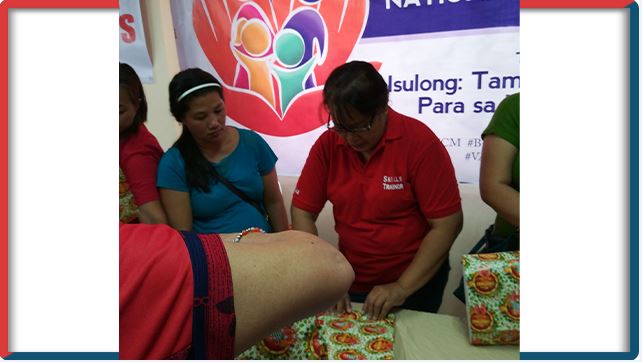
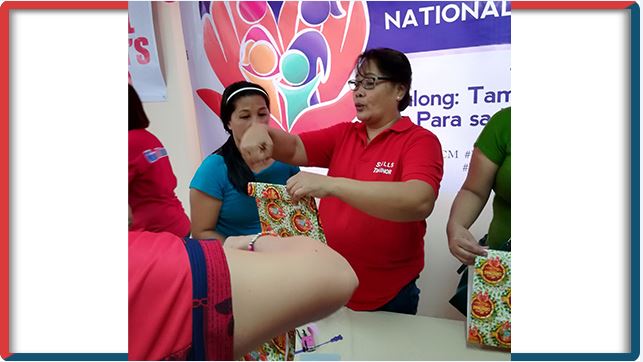
PROGRAMS
WOMEN’S RIGHTS AWARENESS PROGRAM
As part of the Women’s Month celebration, the QCPC conducted a Women’s Rights Awareness Session for women, young female survivors, and their parents. The session aimed to remind the participants of the QC Protection Center’s programs to educate them on relevant laws concerning women and to inspire and empower both women and girls to become agents of change, contributing to the promotion of gender equality and the empowerment of all women.
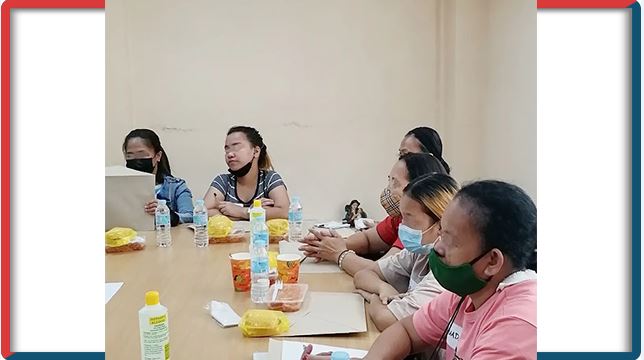
WOMEN’S MONTH FREE PAP SMEAR SCREENING
Celebrate Women’s Month by promoting women’s health and well-being through a Free Pap Smear Screening Campaign. The primary goal is to provide accessible cervical cancer screenings to women in our community, empowering them to take charge of their health and fostering a culture of preventive care.
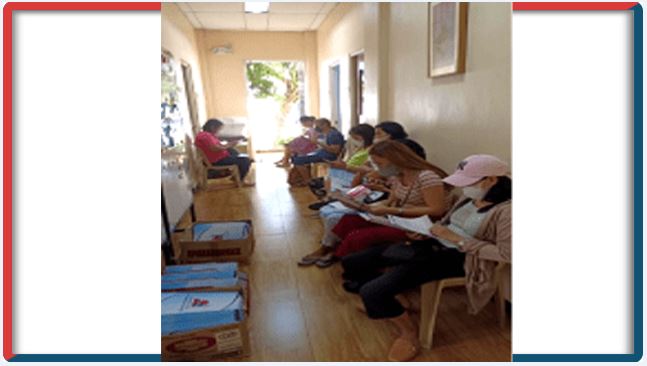

WOMEN’S MONTH HEALTHY MOMMY, HEALTHY BABY
Celebrate Women’s Month by empowering young pregnant women with vital health knowledge, emphasizing the significance of prenatal check-ups for a healthy pregnancy and childbirth experience.
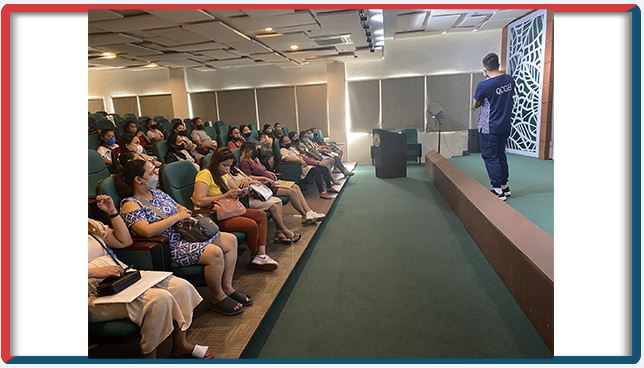
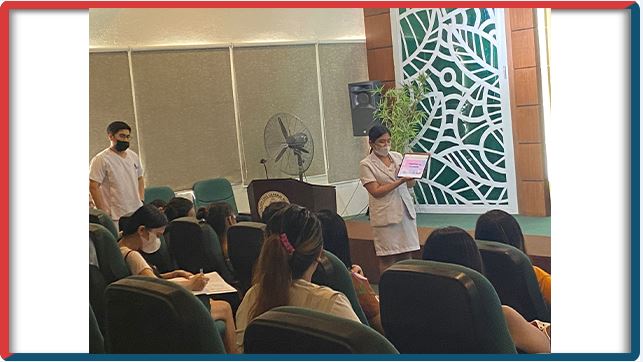
CHILD RIGHTS ADVOCACY AND WELLNESS
Empowering psychosocial activity cultivates awareness of children’s rights while fostering their mental and emotional well-being through interactive and engaging experiences.

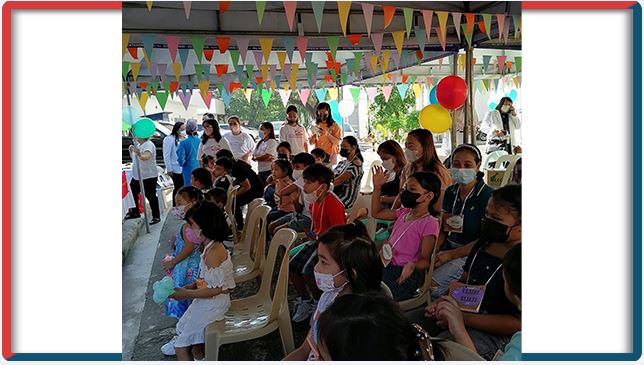
GUIDES
HOW TO AVAIL THE QCPC SERVICES
The Quezon City Protection Center’s services may be availed through the assistance and referrals of GAD Focal Persons and Barangay Council for the Protection of Children and Violence Against Women and their Children Desk of every Barangay in Quezon City, QC Police Station, and Non-government Organizations.
REQUIREMENTS:
These are necessary documentation for records and reports that are important to monitoring case management.
- You must be assisted and issued with a referral letter or,
- Police statement (if applicable)
Walk-in clients are also served in QCPC.
Our center is located inside the compound of the Quezon City General Hospital and Medical Center, Seminary Road, Barangay Bahay Toro, Quezon City.
STEPS:
- If the victim-survivor is referred to the QCPC, the interview shall be done by the Registered Social Worker or an authorized officer of the QCPC. The proper Intake Forms should be accomplished. Assisting Barangay VAWC officers or Police officers, as much as possible, should bring with them an accomplished Referral Letter.
- The victim-survivors should undergo psychosocial counseling, Psychiatric and/or Psychological evaluation, and treatment should be extended, if necessary.
- The physician should be notified and conduct a history and physical examination and collect physical evidence and specimens using the QCPC Medical Intake Sheet, Medical Exam & Diagnosis Form, and Consent Form available at the QCPC or QCGHMC Emergency Room (ER).
- If the victim-survivor is not assisted by any police station, a detailed Police at the QCPC will assist in the drafting of a sworn statement. If assisted by a police station, the detailed Police at QCPC will review the sworn statement and make recommendations to the victim-survivor to strengthen the complaint after which, assist the victim-survivor in filing the case.
DEPARTMENT DIRECTORY
Ms. Janete Oviedo, MPA
City Government Assistant Department Head III
Officer In Charge
8863-0800 local 714
protectioncenter@quezoncity.gov.ph
Divisions/ Sections
| DIVISION | OFFICER NAME | OFFICE ADDRESS | CONTACT INFORMATION |
|---|---|---|---|
| Administrative Unit | Tabitha C. Gabriel Administrative Assistant II | QC General Hospital Medical Center compound, Seminary Road, Barangay Bahay Toro | 8863-0800 local 714 protectioncenter@quezoncity.gov.ph |
| Counseling and Intake Unit | Ms. Joceline Basconcillo Social Welfare Officer III | QC General Hospital Medical Center compound, Seminary Road, Barangay Bahay Toro, Quezon City | 8863-0800 local 714 protectioncenter@quezoncity.gov.ph |
| Medical Unit | Dra. Christine Joy P. Chang OB Gynecologist | QCGHMC compound, Seminary Rd., Brgy. Bahay Toro | 8863-0800 local 714 protectioncenter@quezoncity.gov.ph |
| Legal and Investigation Unit | Atty. Clara Rita A. Padilla Legal Consultant | QCGHMC compound, Seminary Rd., Brgy. Bahay Toro | 8863-0800 local 714 protectioncenter@quezoncity.gov.ph |
Spotlight
LEADING THE ADVOCACY
Since December 2011, the QCPC has expanded its scope and programs. As Quezon City is a major urban metropolis to which migrants are constantly moving, the QCPC has catered not only to residents of the city but also those from nearby cities and provinces. The QCPC handles various cases including but not limited to domestic violence, child abuse, rape, sexual harassment, and discrimination against LGBTQIA+ people. The QCPC has already assisted 2,265 clients/victims of physical and sexual abuse composed of women, children, and LGBTQIA+ individuals.

ECONOMIC EMPOWERMENT
Based on records, most of the victims still opt not to file charges against their perpetrators or leave the abusive condition due to their respective families’ financial situations. For this reason, the QCPC provides livelihood and educational assistance to its clients to give them more options and choices that can enable them to break free from the cycle of violence and abuse.
The QCPC has also assisted clients in becoming self-sufficient by including them in the mayor’s sari-sari store program that affords them PHP 10,000 worth of goods and micro-business management training. To date, these livelihood beneficiaries continue to operate their sari-sari stores, providing them with additional daily income estimated between PHP 200 and PHP 500. The QCPC deems it important for its clients to experience self-fulfillment and financial freedom/independence for them to eventually achieve economic empowerment.


Resources
QCPC Citizen Charter 2025
QCPC Citizen Charter 2024
QCPC Citizen Charter 2023
QCPC Citizen Charter 2022







